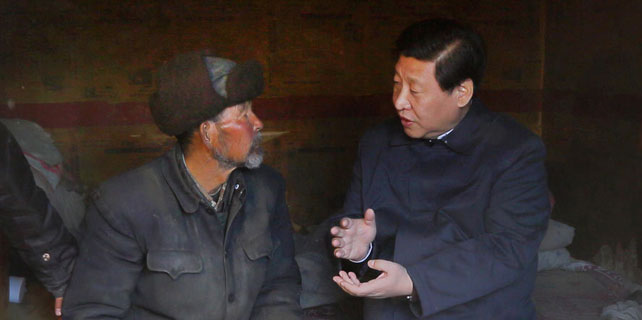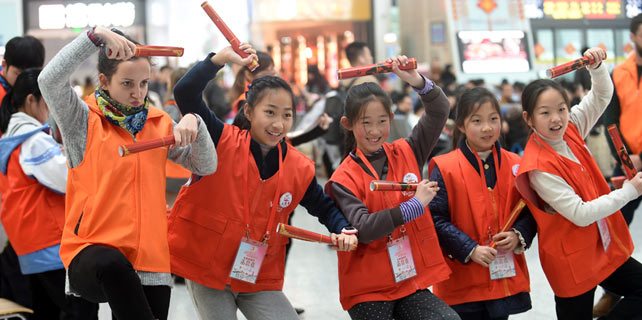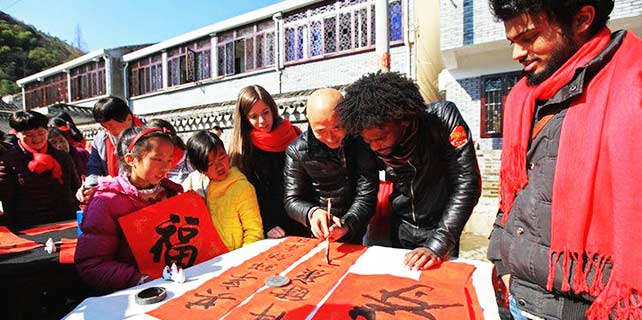Rural matchmakers fade into history
JINAN -- The month leading up to the Chinese Lunar New Year has always been the busiest in the year for matchmakers like Zhang Kelan in rural Shandong Province.
People in the countryside like to tie the knot at auspicious times, and it was traditionally a matchmaker who would be counted on to find a perfect match.
But for the past few Spring Festivals, business has not been so good.
This year, Zhang, 83, decided it was time to retire with pride. In her half-century career as a matchmaker, Zhang paired 104 couples -- an impeccable record in her tiny village.
"All ended in happy marriages. Not a single divorce," Zhang said.
She attributes her success to her straight-forward character, skillful handling of customs, and instinct to read the minds of parents.
Though material wealth is not the only criteria, it matters.
"In the 80s, I sized up a family's wealth by counting their cattle. In the 90s, home appliances. After 2000, houses and cars," Zhang said.
Before the opening up, Chinese villages were a closed society. Family patriarchs wielded considerable clout in deciding who their sons and daughters should marry. Matchmakers were entrusted to find the perfect match and smooth over the complicated customs of getting families to agree on bridal dowries and ceremonial details.
Shandong is the home province of ancient philosopher Confucius and where his teachings on family hierarchy and respect for established rules of behavior take deepest root.
Zhang said it could take up to a year to go through the details-obsessed premarital customs: inquiries about names, the first meeting, further meetings, proposal, marriage. A small mistake could derail an otherwise happy ending.
But that all sounds a bit last century.
China's relentless economic development in the past decades has changed rural life. Many young adults have joined the 274-million migrant work force to find jobs in the cities. They meet, get married and settle down. Few now rely on resources from home to find love.
Between 2011 and 2015, 20 million people settled in cities every year. By 2015, permanent urban residents had accounted for 56.1 percent of the country's population.
Even the few who stay in their villages are becoming tech-savvy. Thanks to the Internet, they can easily meet people on social media, such as QQ and WeChat, rendering village matchmakers obsolete.
Online dating sites have also sprung up, as investors cash in on the huge market. Jiayuan.com, one such site, listed on the NASDAQ in 2011. It claims to have 160 million registered users, with monthly active users reaching 5.3 million.
While dating sites cater to the needs of urban lonely hearts whose time is largely occupied by work, young adults in rural areas now have more time and freedom to mix and mingle.
"In the past, the bride and the groom could not even meet without matchmakers. Now, few come to us for such an encounter," Zhang said.
She said, nostalgically, that she used to be the first person people would come to in the good old days.
If she accepted a job, families paid her with gifts of candy, tea, liquor, and sometimes cash amounting to 200 yuan ($29).
"It alone was not enough to make a living, but I enjoyed doing it as a bit of philanthropy," Zhang said. "It is always a blessing to see couples live happily ever after."
Guo Xiurong, 75, and his wife were the first couple whose marriage Zhang brokered.
Like many of Zhang's clients, Guo spoke highly of the old-fashioned matchmaker's role in making rural marriage possible.
On a sad note, another client, Chen Xiuqin said that even the best in the trade like Zhang would eventually fade into history.
There is no estimate for the number of professional matchmakers still working. The trade is largely taken on part-time by relatives.
"As the profession disappears, it means our society has developed," Zhang said.






















